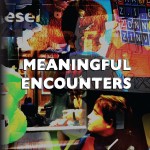Meaningful Encounters
Explorative studies about designers learning from children with autism
Just like any other person, children with autism need products and services that fit their needs and experiences. Imagine you are briefed to design a product or service for non-verbal children with autism, while you have no experience whatsoever with the user group. You might search on the internet for more information, watch the Hollywood production Rainman, or look for books that explain these children’s behaviour. However, the way that children with autism truly think and act is left up to your imagination. Direct contact or an encounter is the only means to come closer to the needs and experiences of these children.
This dissertation investigates how designers can have meaningful encounters with these children and their caregivers to inform and inspire new product development. It describes a framework, several tools and techniques, and a set of guidelines for practice.
The studies indicated the necessity for designers to familiarize themselves with the new context, observe the children without any instructions to record these observations in order to immerse, and consciously search for moments in which the children give a different meaning to objects and/or interactions than they do themselves.

Download Meaningful Encounters (PDF 45 MB)
Visit http://www.helmavanrijn.nl/proefschrift for information about my dissertation in Dutch.




